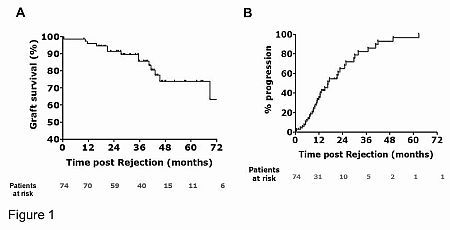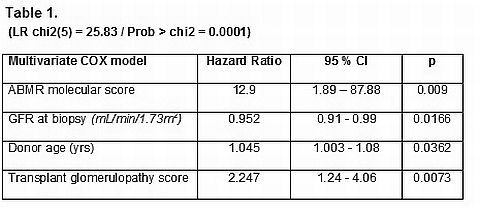Gene Expression Assessment in Kidney Transplant Biopsies To Predict Outcomes in Antibody-Mediated Rejection
Hôpital Necker, Paris, France
University of Alberta, Edmonton, Canada
Paris Cardiovascular Research Centre, Paris, France
Hôpital Européen Georges Pompidou, Paris, France
Meeting: 2013 American Transplant Congress
Abstract number: 27
Antibody-mediated rejection (ABMR) is a major cause of kidney transplant failure, but the determinants of outcome are poorly defined. We hypothesized that disease activity and thus gene expression would be an independent predictor of failure. From 939 kidney transplants at Necker Hospital, we identified 74 presensitized recipients with biopsy-proven ABMR. We examined donor-specific HLA antibody (DSA); biopsy findings (histologic lesions and deposition of complement factor C4d), and clinical course, and compared these with previously derived microarray-based gene expression measurement, the ABMR molecular score. ABMR was diagnosed 8.5±12 months post-transplant by histology and DSA; 41/75 (55%) were C4d positive. The ABMR score was elevated in most biopsies with histology-DSA diagnosis of ABMR, but did not correlate with histology or DSA features. Kidney survival was 63% at six years after diagnosis. The ABMR score was associated with risk of failure, as was donor age, GFR, atrophy-fibrosis, and transplant glomerulopathy (TG). In a multivariate Cox model, the conventional features independently associated with failure were GFR (HR=0.94, p=0.008), donor age (HR=1.04, p=0.04) and TG (HR 2.26, p=0.008). After adjusting for conventional features, the ABMR score (HR=12.9, p=0.009) was the strongest association with risk of failure. The ABMR score (plus peritubular capillaritis) was independently correlated with progression of TG. Thus in highly sensitized kidney recipients with ABMR, the ABMR score independently predicts kidney allograft failure and progression to TG. We conclude that gene-profiling strategy will be useful in stratifying stages of ABMR activity and risk of failure.


To cite this abstract in AMA style:
Loupy A, Reeve J, Chang J, Hidalgo L, Vernerey D, Hill G, Legendre C, Halloran P. Gene Expression Assessment in Kidney Transplant Biopsies To Predict Outcomes in Antibody-Mediated Rejection [abstract]. Am J Transplant. 2013; 13 (suppl 5). https://atcmeetingabstracts.com/abstract/gene-expression-assessment-in-kidney-transplant-biopsies-to-predict-outcomes-in-antibody-mediated-rejection/. Accessed February 7, 2026.« Back to 2013 American Transplant Congress
